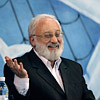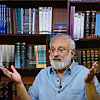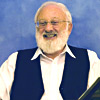The Diagnosis Of Bialik
One of the leading Russian news sites in Israel, Zahav.ru, published this article by my student.
“The Diagnosis of Bialik”
“Scholarly Jews who were present in the early days of the state of Israel shaped the goal which identified the main problem it faces. Nevertheless, this didn’t prevent us from continuing to postpone the solution for a later time.
“Tel Aviv, Balfour Street, the year 1934. The last speech of Chaim Nachman Bialik. Soon he will travel to Vienna for an operation and return from there in a coffin. What did he talk about? About the division and the hatred that is destroying us from within: ‘How did we greet our brothers fleeing from war? We raised the price of housing and took their last pennies from them…the glitter of the Satanic gold blinded our eyes. We boasted the shine of the devilish gold blinds our eyes. We took pride in our initiative and prosperity, but in fact this was an empty speculative commotion.’
“What concerned Bialik was not the external threats, not problems with the authorities, but the root of all the troubles of the people—losing themselves in the twisting road of history. For hundreds of years they tried ‘to be like everyone else,’ conforming to the external standards. And even on their own land they continued in the same direction of assimilation—not physically, but ideologically and according to values.
“To this very day we have insisted upon imitating the ‘enlightened’ part of humanity, and are convinced that this is the only right way. But is it not here that our essential error lies because of which we haven’t attained true peace, not with our neighbors and not with ourselves?
“The conclusion of Bialik is prophetic and relevant for our times: ‘The main symptom of the disease is a terrible lack of internal unity, factional conflict and unfounded hatred that is tearing us apart.’
“Since the time that we fought for our independence, for our right to live in this land, we have not stopped quarreling between us and we even murder each other on the basis of factional disputes, as in the case of the ‘Altalena.’ We don’t miss an opportunity to warm our hands on the troubles of our brothers. Imagine the development of events in the case of a great new immigration, say from the Ukraine or from France and Belgium. I’m sure you’ve said this before—raise the price of housing!
“So what has changed? Nothing. It makes no difference that now laws are accepted in the Knesset of Israel and not by the Mandate government—we still remain in spiritual exile, on the outskirts of the land to which we should have returned differently, not just physically.
“It wasn’t only Bialik who indicated that separation is the main problem of the Jewish people and unity is the key to prosperity. Bialik, the famous poet, often visited a modest house in the old neighborhood of Tel Aviv, Neve Tzedek, at 21 Brotherhood Street, where Abraham Kook, the first Chief Rabbi of Israel, lived. In the 60 years since the nation of Israel was born, specifically he has been recognized by the entire nation as the person who has had the greatest influence on Judaism. One line below his would be—the name David Ben-Gurion. Nevertheless this recognition has remained as merely a formality, as a memorial to Rav Kook. After all, we haven’t listened to his message from the last century.
“And Abraham Kook spoke and shouted that we lacked cohesion and an understanding of our role in history. He saw the immigration to Israel as a basis for the revival of the nation and unity as a unifying platform for self-realization. Nevertheless, many in the religious sector hated Rav Kook because of his commitment to Zionism, and the secular, on the contrary, hated him because of his faith. In the Autumn of 1913, together with a group of Zionist Rabbis, Rav Kook entered the dining hall of Kibbutz Merhaviah, and immediately silence pervaded the room.
“Many suspicious glances stared at the strange guests, and one of the settlers shouted: ‘Don’t waste your words and energy, you will not find even one here who will join you!’ Rav Kook approached him and said: ‘We have come not to be joined but to join.’
“Over the course of hundreds of years we have lost the ability to appreciate our sages. Maybe Kook, like Bialik, appeared before his time, and remains as a believer in a utopia that is not understood, though in fact he didn’t talk about anything utopian. Today, when before our eyes we differentiate between people from different nations, cultivating enmity and hatred between them and do this with understanding, unity seems like a very logical solution and even a necessity.
“But the word ‘logic’ is not written on our flag. The Gallup center recently arranged a global survey about problems that concern people. 70 thousand people from 65 nations indicated their problems —’crying’ about corruption (21% in contrast to 15% in the previous year), economic difficulties (14%) poverty and inequality (12%). In brief these are problems that are recognized and understood in Israel. But these are the results. And there is one cause—isolation, apathy, mutual distance in heart and mind.
“Why doesn’t anyone complain about this? Maybe people are simply confused by the media? But we already know the answer that was heard not long ago and hasn’t lost its relevance.
“How is it possible to reach us? Even the Holocaust didn’t cause the people to think again about their fate.
“’I already let my essential considerations be heard in the year 1933. In addition to this, I spoke with the leaders of the generation, and my words weren’t accepted then, even though I shouted loudly and warned about the collapse of the world, but this didn’t make an impression….’ —that is what a close friend of Abraham Kook wrote, the Kabbalist Yehudah Ashlag. He shouted not only here, but in Poland too, from which he tried to bring out 300 families before the Second World War. Everything was ready, and nobody interfered, except…the Jewish leadership that banished Ashlag and really drove him away to Palestine, making it impossible for him to realize his plan. Needless to say, both those leaders and the families that he enlisted perished in the Holocaust.
“Isn’t all of this enough for us to draw conclusions? For us it is not enough.
“’The son of Ashlag came to me,’ writes Ben-Gurion in his diary in the year 1958, ‘I told him about my meetings with his father, when I wanted to talk with him about Kabbalah and he wanted to talk with me about Socialism…,’ that’s all.
“Smart, knowledgeable, caring people unanimously indicated the essence of the problems, the systemic social defect that impeded the nation from the start, but their voice has been swallowed in the cacophony of mutual accusations and recriminations, in minute disputes with great implications. If even a person possessing stature like Ben-Gurion didn’t comprehend, didn’t absorb, the message that was so clear to the members of his generation, it is not surprising that we still suffer from the same malady.
“The diagnosis of Bialik is correct: in our land we are strangers to each other to a great degree. Israel is split, divided into sectors, and confused by a greedy gaze at a golden calf clothed in the honorable clothing of liberal values.
“Are we the only democracy in the Middle East? Yes. But democracy is sick, lacking warmth in the normal relationships between people. So has the time come to recover from the illness? ‘Our Tel Aviv is sick,’ said Bialik, ‘And I bless you and myself for us to merit to see signs of recovery after I return.’ Sometimes hope lives longer than the person himself and passes on to his descendants, so that they will realize it in spite of everything.”
[138224]
Related Material:
Do What Baal HaSulam Did Not Succeed In Doing
An Inter-Factional Approach
The Scene Of Contention


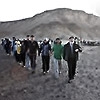

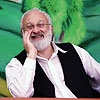
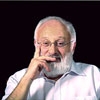
 In the News (
In the News (